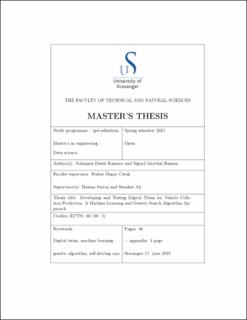| dc.description.abstract | This thesis focuses on developing a digital twin which can predict and avoid collisions. The digital twin does this by using different machine learning models that are trained on data from the SVL Simulator. By harnessing the power of machine learning, the digital twin demonstrates promising abilities in collision prediction and prevention. Additionally, a genetic search algorithm is developed to generate specialized testing data, enabling comprehensive evaluation of the digital twin's performance.
The central contribution of this research lies in exploring the viability of utilizing test data that is generated by a genetic search algorithm to evaluate the performance of the digital twin. By employing the genetic search algorithm to generate data resembling real collision scenarios, classified as collisions, an interesting evaluation framework is established. Through the evaluation process, which involves analyzing the number of accurately classified collisions by the digital twin, insights are gained into the model's effectiveness in predicting collisions.
This contributes to the ongoing efforts in enhancing the accuracy of collision prediction systems, ultimately leading to improved safety measures in autonomous driving and intelligent transportation systems. | |
